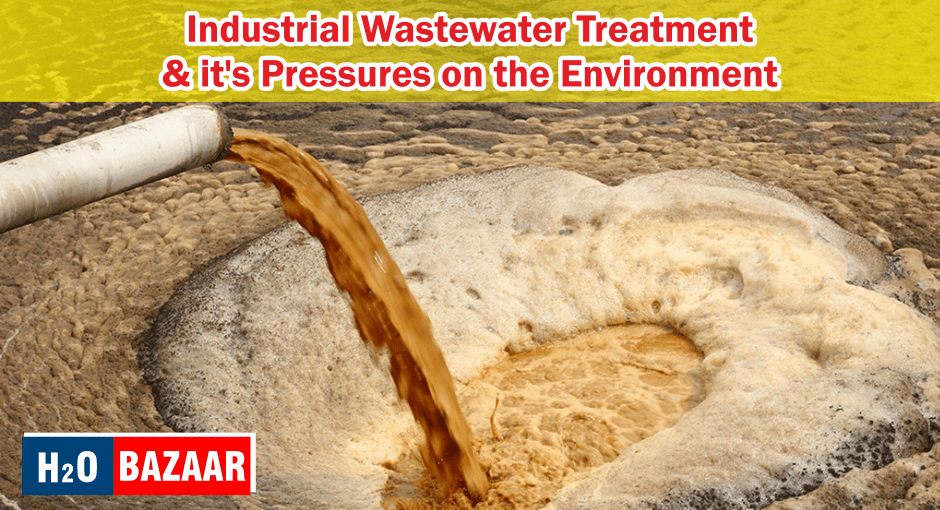


May 19
Industrial wastewater is produced by more than only mining, oil and gas, and chemical manufacturing firms. However, it is also a by-product of the food and beverage processing sectors and is essential for the creation of your clothes, shoes, computer, and vehicle. The list of sectors facing increasing wastewater concerns is endless. Filter presses are used in a wide variety of industrial settings for the treatment of wastewater.
There are laws and regulations that industries have to comply with and manage any organic and inorganic pollutants in the water used for industrial production. All organic matter, metals, and other similar objects found in the wastewater must be removed before the water is safely discharged back to land, into water bodies, or reused in plant operations.
The waste produced by various industrial operations contains many potential contaminants and also hazardous waste. Some of the few examples are oil & gas fracking, mining, metal finishers, chemical manufacturing, textiles industry processes, steel/iron production, power plants food processing, etc.
Filter presses are a crucial solution for treating industrial wastewater and effluent wastewater across a huge range of industries, as mentioned above. There are numerous further industrial uses for filter presses in the treatment of wastewater.
Various industry producers can effectively and efficiently dewater their sludge using cutting-edge industrial filter press technology in order to comply with environmental standards. Filter presses, along with filter plates and cloth, can be tailored to meet specific industrial needs, and making the right choice is crucial for maximizing press performance and producing high-quality, dry filter cakes for economical disposal.
India’s largest online marketplace www.H2obazaar.com assists manufacturers to get customised with a properly designed and engineered filter press system so that manufacturing companies can achieve their wastewater objectives. It includes reducing environmental damage and conserving/reusing limited water supplies.
The disposal of Industrial wastewater is one of the prominent reasons leading to environmental degradation. Industrial wastewater contains harmful substances like toxic chemicals, heavy metals, pathogens, acids oil and grease, sludge, etc which are dangerous to marine life and the ecosystem. Moreover, wastewater that contains oil and grease is very difficult to break down and float on the surface of the water. As a result, water-photosynthetic plants are deprived of the light they need to survive. It also deprives aquatic animals of optimum oxygen levels, which has a negative impact on the overall aquatic ecosystem. Hence, untreated disposal of such water severely affects the surrounding.
There are many new technological advancements, including digitization and automation of treatment methods providing remote operations that are possible to monitor remotely and use online analytical instruments like Supervisory Control and Data Acquisition (SCADA), Internet of Things (IoT), Artificial Intelligence (AI) and other process control software. Such advanced systems considerably improve operations, reducing the requirement for errors. Additionally, there are new methods of membrane filtration introduced from time to time. Membrane filtration is critical in the treatment of wastewater and water reclamation systems.
Other filtrations like nano, micro, and ultrafiltration membranes are effective in removing a wide range of dissolved pollutants. Apart from this, other methods such as Advanced Oxidation Processes (AOP), AVF, and UV irradiation are implemented to address current and future therapeutic needs.
Additionally, industries should have sufficient manpower at wastewater treatment plants to correctly treat wastewater. The staff should be efficient and productive professionals with industry knowledge. However, many industries have insufficient numbers of staff to carry out the required job. Hence, automation can be an alternative solution to the labour problem. It will not only bond the gap in essential jobs but also relieve stress on current employees. One of the most important problems impeding market revenue growth is the cost-intensive component when combined with poor margins.
Membrane Bioreactor (MBR) is proven to be a critical developing technology for treating high-strength wastewater produced in food and beverage processing industries such as champagne and beer production, fish and meat processing plants, and plants and vegetables. Brewery effluent has a high concentration of oxidizable chemicals and biological elements, making it very challenging to clean. Technological developments catering to this sector are increasing the treatment of wastewater, resulting in overall market revenue growth on an international scale.
Waterborne illnesses necessitate the provision of safe drinking water, which is fostering the market expansion for wastewater treatment services. Water bodies across the country are full of effluents and have adverse effects on life owing to increased levels of water pollution. As a result, state governments across the country are taking steps to supply pure and safe water. Another major factor behind the growth of Indian wastewater treatment is the presence of several key companies such as Xylem, Veolia, Dow, Dupont LANXESS, and others. These businesses are offering a number of innovations that are changing the nation’s economy on a worldwide scale. To view their products and technology, visit Water Today’s exhibitions organized across India and International locations and learn from experts directly about the advanced treatment technologies available.
If wastewater effluents are not properly treated, they can cause nutrient overload, which frequently results in algal blooms; dissolved oxygen depletion, which often causes fish kills and the extinction of other species; destruction of aquatic habitats due to sedimentation and increased water flow; acute or chronic toxicity of chemical contaminants to aquatic life; and bioaccumulation of chemicals in the food chain. Because of these unsustainable consequences on the economy, society, and environment, all wastewater needs to be treated before it can be discharged. Following environmental regulations and standards can aid in protecting the quality of receiving waters from effluent discharges, and a stringent list of requirements should be followed.